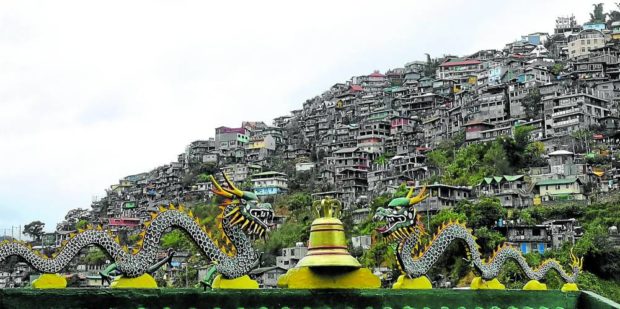With no space left, Baguio buys land in nearby towns
MOUNTAIN SETTLEMENTS | Every inch of space is valuable in Baguio City, as the summer capital, originally designed for 25,000 people in the early 1900s, continues to attract businesses, migrants, students and tourists. —EV ESPIRITU
BAGUIO CITY, Benguet, Philippines — With public lands dwindling in this city, the local government has started acquiring lots outside its territory for potential investments in industrial, forest, and even high-end settlement projects, Mayor Benjamin Magalong said on Monday.
During the city council’s session, Magalong and the city planning officer, Donna Tabangin, explained what they described as a “strategic” land banking program when the city council tackled one of the city’s impending first purchases involving a 6.3-hectare property in neighboring Tuba town in Benguet province.
Land banking refers to the conservation of idle lands for future economic or social service purposes, Tabangin said.
The safekeeping of Baguio lands was first tackled by the city council last year as a recourse to preserve the city’s diminishing forest reserves, and was also briefly considered for in-city farming in the early 2000s to ensure Baguio gets an alternative food source.
Citing a government land inventory, Tabangin said most properties in the city were private lots, and only a small portion of public lands were available for city use. Baguio properties are priced high in the real estate market.
Tabangin did not disclose the total volume of the city’s remaining land assets during the council session. One of the city properties with premium value is the Baguio public market, which is the subject of negotiations with a shopping mall giant that submitted an unsolicited proposal for its development.
Reelected Councilor Mylene Yaranon asked Tabangin to put up a checklist first so the selection of properties outside the city would be streamlined and more organized.
BLISTT cooperation
The land banking project fulfills the city’s commitment to bring investments to Baguio’s neighbors under an economic-sharing alliance called BLISTT (which stands for Baguio and the Benguet towns of La Trinidad, Itogon, Sablan, Tuba and Tublay), Tabangin said.
This cooperation initiative was first introduced as a way to farm out Baguio investments to the adjoining towns after the city was devastated by the 1990 Luzon earthquake.
Magalong, who was reelected in the May 9 polls, said the Baguio government had received sales pitches from property owners outside the city and was studying these offers.
He said these prospective lots were not being tailored to suit specific projects at the moment.
But the Topinao property in Tuba, which may cost Baguio between P95 million and P120 million, may accommodate a new economic zone given that the Baguio City Economic Zone, one of the country’s oldest, has limited space.
Magalong said Baguio needed additional properties for land development proposals now being reviewed by the local government to address a housing backlog of about 5,000 units.
In 2021, Baguio was asked to buy a property in Sablan town, also in Benguet, which was being eyed for a waste-to-energy project.
According to a Baguio urban carrying capacity study commissioned by the National Economic and Development Authority, the population threshold for “developable lands” (344,940) was breached in 2015, while the threshold for open spaces in Baguio (306,370) was reached in 2008.
This means that these resources are no longer sufficient for Baguio’s population of 366,358 as of the 2020 census.
RELATED STORIES
Baguio’s gains, losses in modern charter
Baguio imposes strict zoning to avert urban decay















